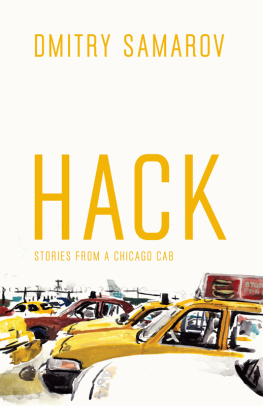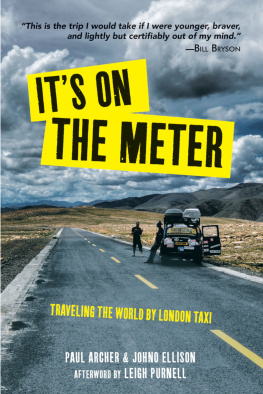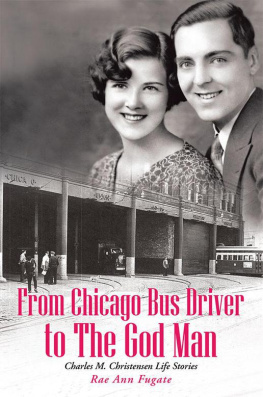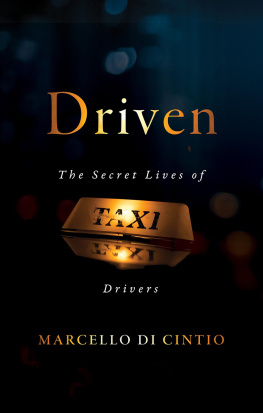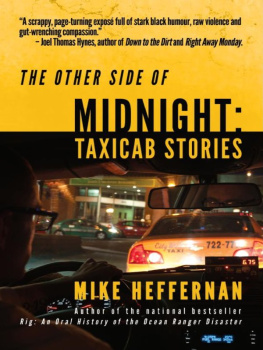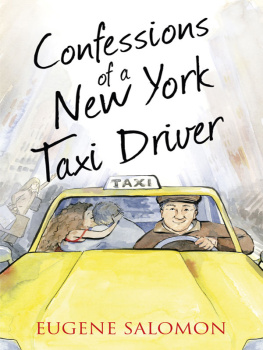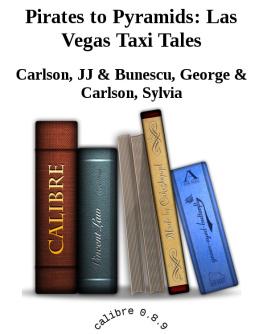HACK
CHICAGO VISIONS AND REVISIONS
Edited by Carlo Rotella, Bill Savage, Carl Smith, and Robert B. Stepto
ALSO IN THE SERIES
The Third City: Chicago and American Urbanism
by Larry Bennett
The Wagon and Other Stories from the City
by Martin Preib
Soldier Field: A Stadium and Its City
by Liam T. A. Ford
Barrio: Photographs from Chicagos Pilsen and Little Village
by Paul DAmato
The Plan of Chicago: Daniel Burnham and the Remaking of the American City
by Carl Smith
CONTENTS
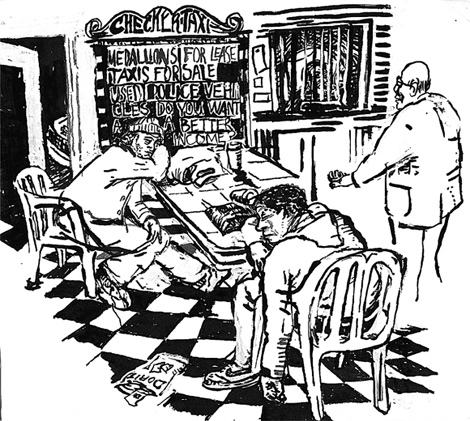
PREFACE
In 1993 I graduated with a BFA in painting and printmaking from the School of the Art Institute of Chicago and moved back to Boston, where my family had settled in 1978 after leaving the Soviet Union.
I needed a job and, flipping through the want ads one day, saw a Drivers Wanted notice. It turned out to be from Checker Taxi of Boston. They told me where to take classes to obtain a Hackney Carriage License, and within two weeks I was behind the wheel of a hulking 1990 Chevrolet Caprice Classic, being told to go to Logan Airport by some jerk in a suit and having no idea how to get there.
I got the hang of it soon enough and kept at it for some three years. It paid my bills, allowed me to paint, and gave intimate access to the city and its inhabitants. Making pictures for me has always been about looking out the window at the surrounding world; being cloistered in an art-related field like teaching or illustration would have made the walls close in on me, whereas rolling around the streets provided ever-changing vistas. Sometimes it was ugly, sometimes beautiful. There was no need to invent or embroider because everything was out there to be seen; it was only a matter of putting in the time.
I moved back to Chicago in 1997 and ran through a succession of service industry jobs, continuing to paint all the while. Around 2000 I decided to attempt an illustrated book, or zine, about my Boston taxi-driving experiences. I called it Hack and, after spending innumerable hours at Kinkos, a first issue was printed in the spring of 2001. A second book followed about a year later, and that would have been that, except the day-job situation was becoming untenable. Anybody who has ever worked at a restaurant or bar knows that those places are vortices of bullshit drama and conflict. Ive never been particularly good with authority figures; sooner or later there would always be a problem with some manager type. By 2003 I was frustrated enough to give cab driving another try. I revived Hack as a blog toward the end of 2006 in order to share some of what Id seen.
Once again the city was open to me in the way that only this job allows. Cabdrivers catch people at the most revealing momentsnot when they have their game faces on, but with their guard down, unable to pretend. To bear witness is both a privilege and a burden, but I dont regret getting back behind that wheel.
A Note about the Illustrations
Most of my pictures, for some twenty years, have been done while looking directly at the subject, so providing illustrations for these stories was a challenge. (I couldnt stop the car mid-fare and ask my passengers to pose for a drawing, could I?) Many of the pictures here were done from memory, and while creating them, I also would work out the wording of stories before actually typing them. Some are caricatures, some mere sketches, while some might even be their own finished visual statements. I used them as a breakthat is, as an opportunity to try out different ways of constructing images. In any case, it was a way into the prose for a painter.
A Note about the Text
The blog from which this book was developed is organized chronologically, of course, whereas what follows is not. In searching for an organic structure that wasnt just a reprint of what had already been, I settled on a days-of-the-week schemecab driving is a 24/7 industry, but some types of rides tend to happen earlier in the week, while others will happen more toward the end. Its my hope that these chapters will relate both the randomness and the order of my days driving in the city.
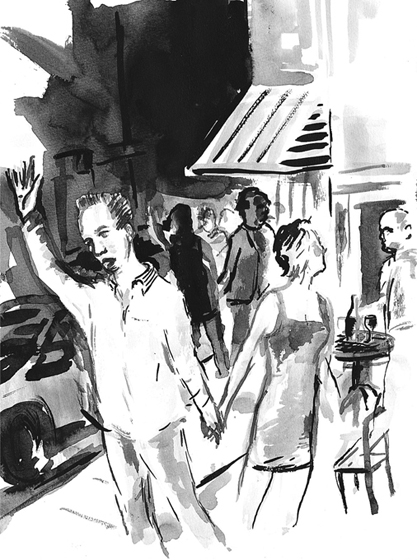
GREETINGS
A raised hand generates an almost irresistible magnetic pull on a taxi driver. After some years, my mind is trained to seek its abstract form in light poles, reflections in parked cars, windblown tree branches, and, on a slow night, just about any likely shape into that desired signalthe symbol of time not spent in vain. Depending on the hour of day or night, what follows that hopeful gesture will vary from absolute silence to aggressive and often unwanted camaraderie, but in almost every case it begins with some sort of greeting.
On afternoons in the Loop, terse one- or two-phrase directives abound. Words like Ogilvie, OHare, Wrigley, Lakeview, Bucktown, Midway, Michigan and Randolph, Ontario, and Chicago, on and on. Like pushing the elevator button, they name their wish with no need for further communication. To expect more than an occasional thank you for the fare displayed on the meter and the sometime addition of a pre-calculated tipworked out from countless identical tripswould be wishful thinking during downtown afternoons. There is a nonverbal contract made between passenger and driver to acknowledge that these transactions are basic and unremarkable, unworthy of excess comment or thought.
With the approach of twilight, tentative signals indicate that work mode is being shed and the thirst for social contact can be detected. Between calls and texts, the passenger might ask about how the days going, usually without expectation or need of any substantive response. Like exercise done at the gyms so many of them attend, this verbal stretch is meaningless except to keep limber in preparation for the heavier lifting that may lie ahead.
In early evening, couples wait at the curb, peering furtively at every passing taxi, sometimes raising their hands after the car has gone by, prompting slammed brakes from more aggressive or desperate drivers. A man wears his button-down untucked over nice jeans, his getup completed more often than not with flip-flops; his date is dressed to the nines from the do to the makeup to the little black dress to the heels that make her teeter long before her first cocktail. Theyll exchange pleasantries in gratitude for the lift. Hell talk to the driver to show her hes got that common touch; shell talk to the driver if shes bored with her guy or nervous. Once in a great while, there will be a conversation that reflects their good spirits, one that will serve to start off their date in a benevolent spirit toward all and sundry.
Packs of men pile in through the night. Theyll start with: Boss, Chief, Buddy, Dude, Man, Bro, Hey, and when they think theyre being funny, Sir. Theyve had a few or more by now, so they break the ice instinctively and without prompting. Theyll ask how things have been, as if with a long-lost friend, and will even feign interest at the answer. Theyll ask where the ladies are, then go back to recapping the talent encountered up to that moment. Theres the possibility of inclusion in their club should I want in. A story or two about those crazy bitches could well qualify me for lifetime membership.
As taverns empty, the greeting runs the gamut from drunken mirth to stone silence. Tipsy chicks continue flirting in the cab as if still sipping appletinis. They laugh too loudly, say too much, and create more intimacy than there should be with a complete stranger. Some recount their evening if theres no one to dial up at this late hour, needing a confidant to vent to. Theyll ask for advice or empathy with no regard for their listeners qualifications or character. Their need to ease their burden trumps the caution they mightve displayed before the sun set. Last are the ones who were over-served and know it; with luck their address can be extracted without too much hassle, and they can be left to drift off into that end-of-the-night-ride-home fugue state. Upon arrival, the lights have to be raised and the drowsing reveler must be addressed in a loud voice: HEY, BUDDY, PAL, CHIEF, TIME TO WAKE UP, YOURE HOME. TIME TO SAY GOOD NIGHT.
Next page
